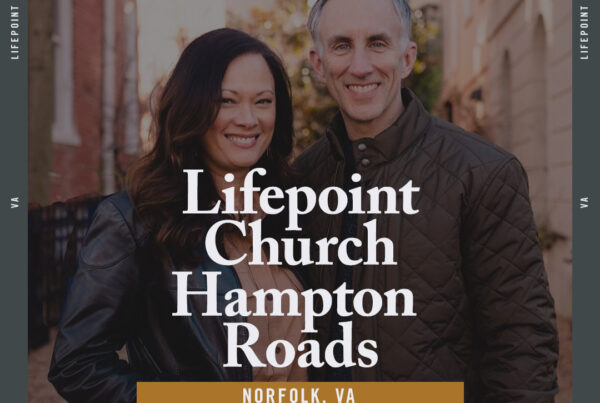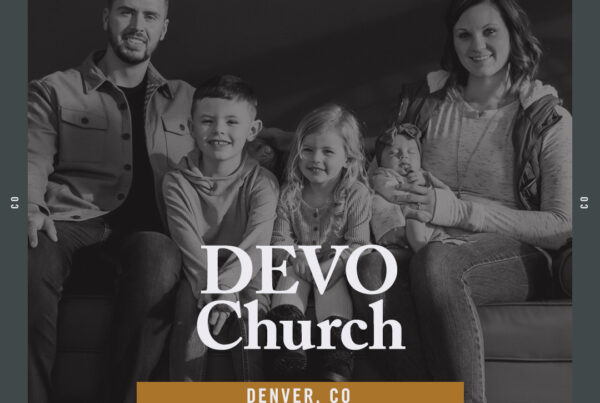In 2017, we moved to Bellevue, Washington, to plant Kalos Church. At the time we didn’t realize this area had been home to a major ministry that had closed its doors. We had naively thought people would be excited about our new church plant. However, as we shared our vision to “make known the beauty of Jesus” by planting a church called “Kalos” (meaning beautiful, noble or good), we were met with hostility. We realized that many had experienced betrayal and loss and weren’t sure if they could ever be part of a church community again.
Early after arriving, we buckled our 11-month-old in the stroller and walked around our block. We struck up a conversation with the first neighbor to cross our path, and after hearing why we moved here, the man bluntly asked, “You’re not going to be one of those pastors who build a big church and then leave us, are you?” He asked this question with an edge of abandonment and longing for the church he once loved and now misses.
Some former Christians in the area told us, “We hope your church doesn’t succeed,” as they dealt with what they a called a deconstruction of faith, while others called themselves “Christian refugees.”
As a child of Sri Lankan refugees, I (Pradeepan) and my wife, Amreitha, felt intrigued by the term “Christian refugees.” The word conveys thoughts of danger, forced displacement, fear, unfamiliar people and cultures and resettlement. While these were not people running for the safety of their physical lives, the Seattle area included thousands of Christians who had permanently lost their spiritual family and church homes. They didn’t know where they belonged, or even if they wanted to belong again.
So, for the past five years we’ve done our best to navigate the waters of pastoring those dealing with hurt experienced from involvement in a structured church community. Some refer to it as “church hurt,” the pain sometimes inflicted by religious institutions. We’d like to share some of our lessons and encouragement for leaders who are trying to do the same.
- The Good Shepherd brings the one back to the 99.
In Luke 15:4-7 (NLT), Jesus shares a story: “If a man has a hundred sheep and one of them gets lost, what will he do? Won’t he leave the ninety-nine others in the wilderness and go to search for the one that is lost until he finds it? And when he has found it, he will joyfully carry it home on his shoulders. When he arrives, he will call together his friends and neighbors, saying, ‘Rejoice with me because I have found my lost sheep.’ In the same way, there is more joy in heaven over one lost sinner who repents and returns to God than over ninety-nine others who are righteous and haven’t strayed away!”
Yes, Jesus leaves the 99 sheep to go after the one lost sheep, but He also brings the one back to the other 99. Part of our responsibility as Christian leaders is gathering people who are like “sheep without shepherds” and bringing them back to the flock. Our American individuality likes to emphasize Jesus leaving the 99 to go after the one, but the story doesn’t end there. Instead of staying in the wilderness, the shepherd joyfully carries the sheep home. It’s hard work. It means reaching people where they are, hurt and all.
The past five years of church planting have included several church “homecoming” moments, and it’s been an utter joy. Yes, the hurt can be real, but to see people reminded of why they missed their church family in the first place is beautiful. As we deal with people’s pain, we must first remember that the church is God’s idea. In fact, Jesus is the one building the church and washing her with the word.
Jesus purchased the church with His blood. Ephesians 5 and Revelation 19 describe the church as the bride of Christ. We can’t abandon the idea of the church because of human failures. In order to protect people from future trauma, some may say the church isn’t important or necessary, but that’s not what the Good Shepherd would do.
- Jesus loves the church He gave his life for.
As ministry leaders, it’s important for us to acknowledge that, because of painful memories, many people hold a posture of loving God but hating the church.
Fresh out of Bible school, we served at a church (that no longer exists) with optimism and passion. We saw miracles and heard great sermons, but we hardly remember those moments. It was the screaming from the pulpit, the hint of scandal, the broken promises that we carried. Although we ran away from that situation, we never stopped loving God. We had to be healed from the pain we experienced as a part of that church.
Now, one of the most powerful ministries we’ve offered to those in our congregation is listening and acknowledging the pain they feel. Instead of quickly defending the perspective of the ministry leaders, we can start with, “Thank you for sharing that with me— that must have been a really hard thing to experience.” Before moving on to a defense of the church or the wisdom of hindsight, it’s OK to connect with someone’s pain and grieve with those who grieve.
Paul instructs the elders in Ephesus, “Be shepherds of the church of God, which He purchased with His own blood” (Acts 20:28, NLT), and this reminds me that even Jesus wasn’t removed from the pain of the church. Helping people deal with hurt is painful work, and it will cost us. Jesus purchased the church with His blood, and now it’s our responsibility as ministry leaders to shepherd that flock.
We know the cost of shepherding God’s flock. As pastors and shepherds, we’ve learned that sheep bite. If anybody understands how painful the church can be, it’s pastors who have been betrayed, abandoned and slandered. If anybody understands church hurt, it’s ministry leaders who have been accused and “ghosted” as soon as another “better” church congregation comes along. As long as the church is filled with people, there will be hurt, and pretending like it doesn’t exist, doesn’t help.
- Healing is more powerful than hurt.
Yes, the church is filled with painful flaws, but Jesus is working on that. Ephesians 5:25-27 (NLT) says, “For husbands, this means love your wives, just as Christ loved the church. He gave up his life for her to make her holy and clean, washed by the cleansing of God’s word. He did this to present her to himself as a glorious church without a spot or wrinkle or any other blemish. Instead, she will be holy and without fault.”
Jesus is cleansing the church and getting ready to present her to Himself as glorious and unblemished. The church is a work in progress, and we have a long way to go, but we can trust God will finish what He started.
In our own journey, we had abandoned our Sunday gathering rhythm and love for the church. We were invited to a small church plant in Minnesota. We timidly showed up, sat down with arms crossed and refused to get involved in any way. The pastors and other ministry leaders never pressured us to do anything or be anything we weren’t. Soon, other church attenders invited us to lunches, coffees and even camping trips! In those environments, these strangers witnessed our pain and told us it was real. Instead of teaching us or gaslighting us, they dove into the depths our experiences and despair with us.
Eventually, we were open to new perspectives of our hurt and bitterness. We started to get involved and serve on teams. We began to love both God and the church. Without a doubt, we were hurt by a church, but in this season were healed by the church.
Now we’ve seen hundreds of people experience the same kind of healing in our own church plant. The church is God’s idea to advance the victory of the cross, and He didn’t provide an alternative. One way or another, the entirety of the church will be beautiful. Kalos Church, the congregation we pastor in the Seattle area, is by no means perfect, but we’re seeing hundreds of people every year start to see the church how God sees it.
We discovered a few reasons individuals and families were drawn to Kalos. For example, women would say things like, “We chose this church because you co-lead as pastors. It automatically shows us there is more than one person with authority, and accountability is ingrained with your pastoral structure.”
Little did we know how impactful the decision to model the pastoral leadership of our church after Priscilla and Aquila in the New Testament would bring comfort and healing to people with hurt. Seeing men and women partner together in humility and mutual respect was new for many church-goers in the Seattle area.
We spent time listening carefully to people’s hesitations to join the church again. When you plant a church, you need a lot of people who are willing to serve. And yet many came burnt out from serving for so long at previous churches and needed a place of refuge just to receive and recover.
As leaders, we want to build a culture in our churches where people don’t just come to receive but also contribute. We found we were able to offer the care and respite people needed, giving them freedom to decide when they were ready to serve. More often than not, when we gave them the space and time to heal and recover without any pressure, they would approach us wanting to serve and give back what they had been given.
Another way we built trust was to be vulnerable about the imperfections of pastors and church leaders. We emphasized the importance of church leaders embracing confession and repentance. While we confidently shared our dedication to what we believed was the call of God on our lives to pastor this church, we shared our own journey of pain in a church where we were not lead pastors, and we share the painful realities of what it’s like to be lead pastors now.
While lead pastors can experience abuse and pain, we’re always responsible to demonstrate the humility Jesus did. We humbly share that pastors are often on the receiving end of the attacks and are often alone in that reality. Creating a culture where this dialogue can exist felt like bridges of empathy were being built between us. Ultimately, what we all found was healing in the church.
These three lessons have come at a cost, but it’s worth it to partner with Jesus in the work of ministry. If you’re reading this, you may have experienced hurt as a part of a church community. For that, we’re sorry. If you’ve carried a burden while trying to help other people with their own, thank you for still caring for the church Jesus purchased with His own blood. Your work is making a difference, and I believe one day Jesus will receive His beautiful and unblemished church. Until then, grace and peace to you as you help others navigate hurt to a place of healing and wholeness.
—
This article was featured in the Spring 2023 AVAIL Journal.

planted with ARC and are the co-lead pastors of Kalos Church in Bellevue, Washington. Pradeepan was born and raised by Sri Lankan Hindu refugees in Minnesota. He carries a passion to comfort the afflicted and afflict the comfortable with the life-changing message of Jesus. He loves puns and painful adventures. Amreitha was born in India and adopted by a family in small-town Kansas. She is also the co-founder of Landmine Design, a humanitarian organization on mission to empower women with safe jobs in areas of Cambodia. She loves cooking curry and casseroles. Together, they have two children, Obadiah and Nalaveli, and are a proud special needs family.





